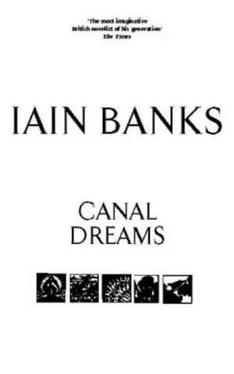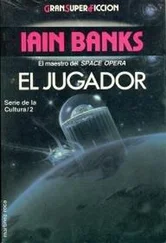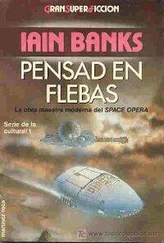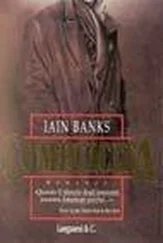There was a brightly lit checkpoint where they left the Canal Area at the junction of Avenida A and Avenida de los Martires. The driver cursed and spat out of the window as they approached the short line of cars and light trucks, though they were soon waved through by the US and Panamanian troops. The queue of vehicles waiting on the far side of the barrier was much longer.
They drove through the city, through the stink of traffic fumes and sudden oases of flower-scent. 'Frangipani, Mr Mandamus said, sniffing deeply, and nodding.
Hisako rolled her window down, letting the hairdryer-hot moist air spill round her as they sped and lurched their way down the crowded avenues. The city was just waking up; it was bright and busy and full of cars with their windows down and their music turned up. Even the troop-filled jeeps they encountered usually had a ghetto-blaster perched on the rear or taped to the T-bar, beside the machine-gun. The population made the biggest impression, though. The streets swarmed with riotously different people; every colour and race she thought she'd ever heard of.
She had gone ashore in Honolulu for a day, while changing ships, and been surprised at how odd it felt to be surrounded by so many gaijin (though the Hawaiian natives hadn't looked all that unusual to her). Then, on the Nakodo , due to take her from Honolulu to Rotterdam via Panama and New Orleans, she'd been surrounded mostly by foreigners; the Korean crew; Broekman, the second engineer; and Mr Mandamus, the one other passenger. Only the three senior officers on the ship, and the steward, were Japanese. So she thought she'd adjusted, but the extravagance of the racial mix, and the sheer numbers of people in Panama, amazed her.
She wondered how Broekman felt. A South African, he professed, and seemed, to despise the white state, but he'd been brought up in it, and she thought Panama must still come as something of a shock to the system.
They drove to the Juji, on the Via Brasil. It was a Japanese restaurant; Mr Mandamus's idea of a surprise. She had wanted to eat local cuisine, but didn't let her disappointment show. The restaurant had a Japanese chef, a skiing fan from Niigata who knew Sapporo well, and they talked for a while ('Only water skiing in Panama! ). The shabu-shabu was good, and the tempura. Broekman grumbled about steaks, but seemed content enough after that. Mr Mandamus, having checked with Hisako that slurping was still quite in order, proceeded enthusiastically to slurp his way through every dish presented, even the dry ones, half-gargling with Kirin beer. On the other side of a screen a noisy group of Japanese bankers easily outdid Mandamus in volume and spent most of the time making elaborate toasts to each other and ordering more sake. She felt she might almost as well be at home.
When they left, the city was still waking up; the nightclubs. and casinos opening for trade. They went to a couple of bars on Avenue Robeno Duran; Mr Mandamus didn't like the look of the first one because most of the men were GIs. 'I have nothing against our American cousins, he explained to Hisako as they walked away. She thought he wasn't going to say anything else, but then he leant close and hissed, 'Danger of bombs! and ducked into another bar. Broekman shook his head.
In the Marriott Casino they gambled, strolling among the green-felt tables and the stunning local women and the men in their white tuxedos. She felt small and dowdy in comparison, like a raggedly dressed child, but with a child's delight at the glitter and buzz of the place, too. The roulette wheels clicked, dice clattered across the baize, cards flicked from manicured hands. Guards the size of sumo wrestlers tried to lumber inconspicuously between the white jackets and long dresses, or stood impassively against the walls, hands behind their backs, displaying tailored bulges under their jackets, only their eyes moving.
Mr. Mandamus lost little and often on the tranganiquel , stuffing quarters into the flashing machines and claiming he had an infallible system. Broekman won two hundred dollars at vingt-et-un and ordered champagne for Hisako, who gambled without much enthusiasm or luck at dado.
They took a taxi back into the centre and walked along the Avenue Balboa, by the side of the bay, where the Pacific broke whitely and patrol boats grumbled in the distance, then finished up in Bacchus II, where Mandamus found ('Ah! Surprise! ) the karaoke room and spent an embarrassingly long time singing along with the Japanese backing tracks, trying to get Hisako to join in, and making noisy friends with the same group of bankers they'd encountered in the Juji.
She was falling asleep in the taxi back to Pier 18.
'… virgins at the shrine would take mouthfuls of rice, and chew it to a pulp and then spit it into the casks, and-
'You're making this up, you crazy man!
'No, no, really; that is how the fermentation was started. An ensign in their saliva-
'A what?
'An ensign in their saliva; their spit.
'I know- Broekman broke off. Hisako jerked her chin off her chest. She yawned. Her head hurt. 'Did you hear that? Broekman said.
'What? Mandamus said. 'Hear what?
'Explosion.
The driver — fat, silver-haired, watching a tiny colour Watchman stuck to the dash when he wasn't overtaking — turned and said something in Spanish. Hisako wondered if Broekman had really said 'explosion'.
She wasn't exactly sure how long afterwards the taxi stopped somewhere on Balboa Heights, the Puente de las Americas to their left, straddling the canal entrance and ablaze with lights. Mandamus helped her from the car, and the three of them and the driver stood at the roadside and looked back down into the bay-cupping city, where a huge fire near the centre was surrounded by a hundred flashing blue and red lights, and a thick column of smoke, like a black cauliflower, climbed towards the orange-smudged clouds.
The crackling of small-arms fire sounded like logs sparking in a grate.
Shaped like an S lying on its side, it was the only place on earth where the sun could rise over the Pacific and set over the Atlantic. One day in 1513 a Spaniard from the province of Extremadura called Vasco Nunez de Balboa — who'd started out as a stowaway on somebody else's expedition, then taken over in a mutiny — climbed a hill in Darien and saw what no European had ever seen before; the Pacific.
Then, they called it the Southern Ocean.
Balboa made friends with the people who already lived in that stretch of land, and an enemy of the man who governed most of the isthmus, which the Spanish called the Castilla del Oro. The governor took his anger out on Balboa's own isthmus; he had him beheaded. The fact that Balboa had become his son-in-law did not stay the blade.
The governor, called Pedrarias the Cruel by history, founded a town on the Pacific coast, near a little fishing village called Panamá. In the local language, panamá meant 'lots of fish'. The Spanish called the trail between it and the Caribbean the Camino Real; the Royal Road. Down that road the looted wealth of the Inca empire went by slave and donkey. The slaves were brought in from Africa to replace the locals, who'd been slaughtered. The donkeys were better treated, and so the slaves escaped into the jungle whenever they could. They were called cimarrones. They formed their own settlements and raised their own armed forces, and sometimes went in league with the English, French and Dutch pirates attracted to the area by the intense concentration of vast wealth; looting the looters.
In 1573 Francis Drake and his gang of licensed pirates attacked the Spanish gold galleons and the town called Nombre de Dios. They captured the town of Cruces and burned it to the ground. Ninety-eight years later, the Welshman Henry Morgan captured Panamá itself; he set fire to it. The treasure required 195 mules. The Spanish rebuilt the city along the coast with bigger walls. Fifty-eight years after that, when Britain and Spain were at war, Admiral Vernon captured Portobelo on the Caribbean coast, plus the. fort of San Lorenzo.
Читать дальше












